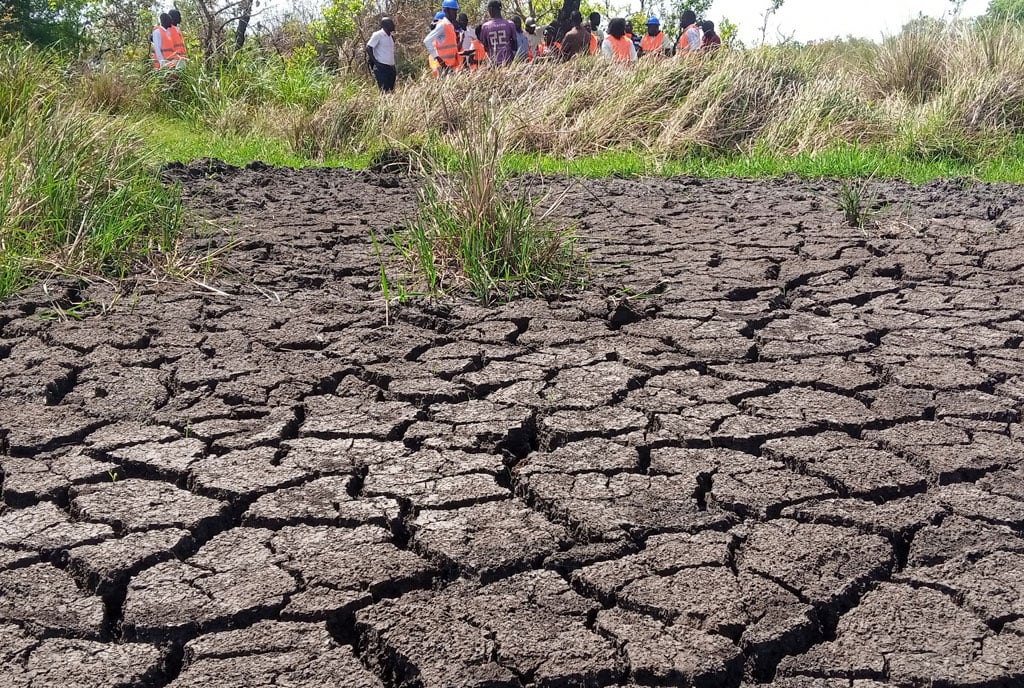Govt should not handle current heatwave lightly

This picture taken last February 21, 2024 shows how the heatwave, coupled with drought, has destroyed a swamp in Pader District. PHOTO/BILL OKETCH
What you need to know:
The issue: Heatwave
Our view: It therefore goes without saying that the government should seriously consider short-term, intermediate, and long-term solutions to such climate change-induced disasters.
The heat map that the Igad (Intergovernmental Authority on Development) Climate Prediction and Application Centre or ICPAC released for the week ended March 19 was a deep, sinister red for eastern Tanzania, eastern and northern Kenya, central to southern Somalia, most parts of South Sudan and southern Sudan. Still, warmer than usual temperatures were predicted over most parts of the East Africa region. This included Uganda where moderate to high temperatures—oscillating anywhere between 20-32℃—were forecasted over most parts of the country.
While the ICPAC’s heat stress index issued a caution for vast swathes of the country, there was the odd extreme caution for a few pockets. To be clear, a caution portends, on the one hand, heat fatigue with prolonged exposure. An extreme caution is, on the other hand, a harbinger of heat exhaustion.
ICPAC’s report for the week set to end on March 26 shows that there will be little or no changes. Temperatures in Uganda will, for one, oscillate between 20-31℃. In fact, there are some pockets of the country that are expected to experience temperature elevation of as high as 2℃. It is imperative that our leaders brace themselves for what is almost certainly to come. This includes, sadly, loss of life, mass migration, crop losses, and soaring food prices.
Muslims in the country, who are well into a month-long Ramadan punctuated with a festive meal (iftar) after daily sunrise to sunset fasts, have to dig deeper into their pockets. Their leaders have already warned that breaking the fast after daylight hours will be a tall order for many.
The prolonged period of abnormally hot weather in the country has made greater the danger of feedback loops and unanticipated events. Already, there has been a spike in snake attacks countrywide as the reptiles relentlessly search for cooler havens. Elsewhere, there is mounting evidence to show that hospital check-ins and admissions of hypertensive patients have spiked rather exponentially in recent weeks. Patients checking into health facilities with various adverse health consequences from severe dehydration, including headaches and dizziness, are also expected to increase.
The net effect of the aforesaid will no doubt be a decline in productivity that will further reduce economic output of a country toiling to make ends meet. All of which points to the need for the government to be more proactive in combating extreme weather. It is currently comfortable being reactive, and this has not been without consequences.
The colossal and immediate challenges to rain-fed agriculture as the barometer drives ferociously upwards are there for all to see. Unfortunately, episodes of hunger loom large. It therefore goes without saying that the government should seriously consider short-term, intermediate, and long-term solutions to such climate change-induced disasters.
Our commitment to you
We pledge:
- To be accurate and fair in all we do.
- To be respectful to all in our pursuit of the truth.
- To refuse to accept any compensation beyond that provided by Monitor Publications Ltd. for what we do in our news gathering and decision-making.
Further, we ask that we be informed whenever you feel that we have fallen short in our attempt to keep these commitments.



